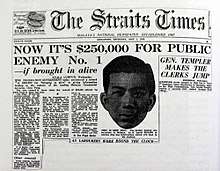Sungai Siput
Sungai Siput (Chinese: 和丰, Tamil: சுங்கை சீப்புட்) is a town, mukim in Kuala Kangsar District, Perak, Malaysia, covering 155.141 hectares, 61.5% of the total area of Kuala Kangsar. It is located about 25 km from state capital, Ipoh and 20 km from royal town of Kuala Kangsar. Sungai Siput falls under the management of the Kuala Kangsar Municipal Council.
History
The earliest settlement in Sungai Siput was situated at Pelang, about 2 kilometres from the current town. The settlement was populated by villagers of Minangkabau origins who had earlier settled in Sayong Kuala Kangsar Perak. The settlers were from the family of Malik and the son Tuyub, which family tomb is still visible from the roadside situated in the estate in front of the Rimba Panjang new village. One the descendants was the late Imam Jusuh, one of the first imams of the Alghufraniah Sungai Siput Mosque and the town councillor. Sister Enson was a well-known traditional healer. One of the surviving siblings is Associate Professor Suhaimi Bin Saidin, a lecturer at Universiti Sultan Azlan Shah in Kuala Kangsar. With the arrival of British planters and tin miners in the early 1850s the focus of activity moved to the present Sungai Siput town.

Sungai Siput is notable for the incident that triggered the start of the Malayan Emergency. The Malayan colonial administration declared a state of emergency on 16 June 1948 after members of the Communist Party of Malaya killed three European plantation managers at a plantation office twenty miles east of Sungai Siput town. The CPM was subsequently banned in July. Many Singaporean historians and anti-communists allege that Chin Peng ordered the killings. Chin Peng claims he had no prior knowledge. In fact, he says he was so unprepared for the start of hostility that he barely escaped arrest, losing his passport in the process, and lost touch with the party for a couple of days.[1]
Li Weilun, an Esperanto professor at the Beijing Language and Culture University, was born in Sungai Siput in 1936.[2]
Demographics
| Ethnic groups in Sungai Siput , 2010 census | ||
|---|---|---|
| Ethnicity | Population | Percentage |
| Chinese | 18,255 | 37.3% |
| Malay | 15,745 | 32.1% |
| Indian | 13,439 | 27.5% |
| Others | 113 | 0.2% |
| Non-citizens | 1,402 | 2.9% |
| Total | 48,954 | 100% |
Locations
Mahatma Gandhi Kalasalai Tamil School is the biggest Tamil school in the state with over 1000 students. The school's construction was commissioned by Tun V. T. Sambanthan in 1954 and was officially opened by Vijaya Lakshmi Pandit, former Indian Prime Minister Jawaharlal Nehru's sister.
Sungai Siput is also famous for its groundnuts and can easily be bought in one of the shop along the main street.
Politics
Since the 2008 Malaysian general election, the Sungai Siput parliamentary constituency is represented by Dr Jeyakumar Devaraj, from Pakatan Rakyat Party, in the Dewan Rakyat, the lower house of Malaysian Parliament. Dr Michael Jeyakumar Devaraj defeated the previous incumbent, Dato Seri Samy Vellu, who had held the seat since 1974. Ahamad Bin Pakeh Adam from Barisan Nasional is the current state assemblyman for Lintang state seat and from DAP is the current state assemblyman for Jalong state seat. He is also the State Local Government Committee chairman.
See also
References
- ↑ Chin Peng, My Side of History, pp 215-222.
- ↑ Fiocchi, Pietro (2013-07-19). "Esperanto kaj la vivo en la Pekina Lingva Universitato". El Popola Ĉinio. Retrieved 2017-12-19.
Nia samideano naskiĝis en 1936 en Malajzio, en la urbo Sungai Sipud.